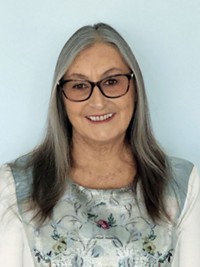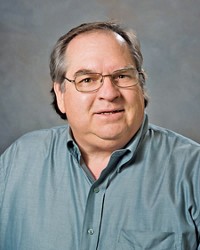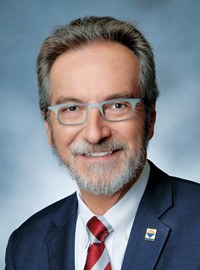Advertisement
Grab your lab coat. Let's get started
Welcome!
Welcome!
Create an account below to get 6 C&EN articles per month, receive newsletters and more - all free.
It seems this is your first time logging in online. Please enter the following information to continue.
As an ACS member you automatically get access to this site. All we need is few more details to create your reading experience.
Not you? Sign in with a different account.
Not you? Sign in with a different account.
ERROR 1
ERROR 1
ERROR 2
ERROR 2
ERROR 2
ERROR 2
ERROR 2
Password and Confirm password must match.
If you have an ACS member number, please enter it here so we can link this account to your membership. (optional)
ERROR 2
ACS values your privacy. By submitting your information, you are gaining access to C&EN and subscribing to our weekly newsletter. We use the information you provide to make your reading experience better, and we will never sell your data to third party members.
Policy
Thematic Programming at National Meetings
by Dwight W. Chasar, Chair, Divisional Activities Committee
April 3, 2006
| A version of this story appeared in
Volume 84, Issue 14
Everything changes except for the Law of Change itself. The American Chemical Society is not immune to the law. New communication technologies, the evolving expectations of members, competition from other technical organizations, job opportunities, and the increase in the multidisciplinary nature of chemistry all conspire to create new opportunities and to mandate change.
In October 2004, leaders of all ACS divisions were invited to explore ways to improve divisional structure, particularly with regard to programming at national meetings. These discussions were held at the Divisional Summit in Charlotte, N.C, which was hosted by Ruth Hathaway of the Divisional Activities Committee (DAC) and Steve A. Fleming of the Meetings & Expositions Committee (M&E).
Many divisions were ready to make changes, particularly in programming toward thematic topics in multidisciplinary areas. The prospect raised questions as well. Who would lead the change? How would we overcome the barriers (real or perceived) to making these changes?
Some of these barriers included the means of theme selection, sources of funding, even-programming rules, locations, and coordination. DAC is responsible for seeing that divisions carry out their responsibilities as stipulated in the society's bylaws but also does all that it can to remove obstacles to the good work of divisions. Thus, DAC made the commitment to help bring these proposed changes to fruition.
In thematic programming, a theme like nanotechnology, biotechnology, or some narrower aspect thereof, is first selected, and then all the divisions interested in that topic are asked to program into it with their own disciplinary slants. Divisions can offer as much as complete symposia or as little as one paper on the subject. The goal is to bring as many disciplines to bear on a subject as needed to understand and help solve problems associated with the topic. Second, to maximize convenience for the theme session attendees, all the symposia associated with the theme need to be colocated. This means that adjacent rooms in the same building need to be reserved for these thematic programs, which creates a new challenge for M&E.
Since that day in 2004, DAC has worked feverishly to promote the idea of thematic programming. Whether at the divisional leadership conferences, Program Planning & Coordination Conferences, luncheons for divisional representatives, or divisional officer and councilor caucuses at the national meetings, DAC has presented its ideas and solicited those of the divisions as to possible themes for future meetings. DAC heard some spirited concerns from division representatives; nonetheless, many divisions said they were ready to try this concept—and the sooner the better. One theme was selected for a trial run.
So, for the San Francisco meeting in September, Ruth Hathaway, as general chair for the theme, has organized a program suggested by and agreed upon by many divisions: "Collaboration in Chemistry: Recovery from and Prevention of Natural Disasters." This topic is timely. This year marks the 100-year anniversary of the great earthquake and fire in San Francisco, and it will be just one year after Hurricanes Katrina and Rita devastated the U.S. Gulf Coast. As expected, not all divisions will participate, but all were invited.
By a similar process of gathering suggestions from the divisions, working titles for three themes for the Chicago meeting in March 2007 have just been finalized. These are "Chemistry for a Sustainable Energy Future," "Chemistry for a Sustainable Future Food Supply," and "Chemistry for a Sustainable Future Water Supply." We are now starting the process of organizing symposia under these themes. During the Atlanta meeting, we worked with as many divisions as possible to solicit their participation. You can work through your own division to program into these themes, and we will also welcome any suggestions or ideas at divisions@acs.org.
DAC is exploring potential themes for the Boston meeting in the fall of 2007, as well as the future meetings in New Orleans and Philadelphia in 2008, so that the divisions can begin their program planning. And that is where you come in. What themes can you come up with that are at the forefront of importance, are multidisciplinary in nature, and may have a particular resonance with the meeting locations? Whom would you suggest as thematic organizers with outstanding stature in the area, strong organizational ability, and experience? Many divisions have offered their ideas, and we eagerly await yours. We welcome your ideas and comments at divisions@acs.org.
Views expressed on this page are those of the author and not necessarily those of ACS.






Join the conversation
Contact the reporter
Submit a Letter to the Editor for publication
Engage with us on Twitter